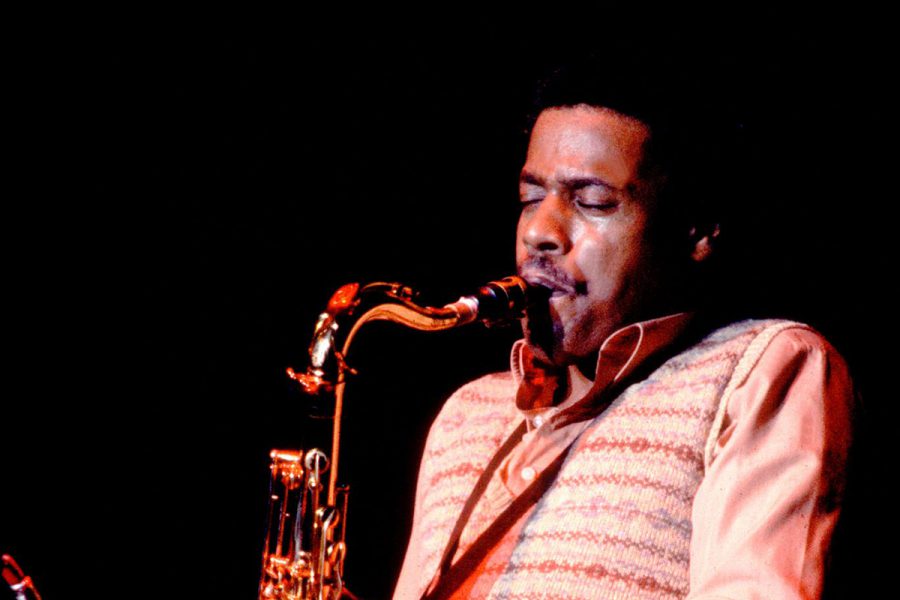Appreciation: Jazz great and innovator Wayne Shorter dead at 89

Wayne Shorter performs at the Park West in Chicago on Nov. 15, 1978. Photo by Paul Natkin/Getty Images.
Famed saxophonist Wayne Shorter died Thursday at the age of 89. Shorter was a jazz giant who not only witnessed jazz history but had a huge role in shaping it. From Art Blakey’s Jazz Messengers in the 1950s to Miles Davis’ slow electrification through the ’60s and the formation of his own project Weather Report, where he helped give birth to jazz fusion, Shorter’s inimitable voice has been a near-constant part of the jazz world for 70 years.
As a young man (Shorter is 26 in the above video) he was immediately recognized as a powerful player, with chops rivaling greats Charlie Parker and John Coltrane. Marrying technical shredding to soulful expression, Shorter personified the virtuosic intensity that characterized early bebop. With Miles Davis, he emerged as a powerful composer and one of the few members of Davis’ band whose contributions were not altered by the demanding bandleader.
“The master writer to me, in [Davis’ 60s] group, was Wayne Shorter. He still is a master,” friend and bandmate Herbie Hancock said during an interview. “Wayne was one of the few people who brought music to Miles that didn’t get changed.” Shorter composed the title track to Davis’ 1967 album, Nefertiti. The song’s sumptuous horn lines and languid coolness are fantastic examples of his melodic sensibility.
You can hear Shorter’s signature coolness even as Davis revs up the electric weirdness on 1970’s Bitches Brew. The double album’s final track, “Sanctuary,” was another masterful Shorter composition. Generally considered the greatest living jazz composer for the last 30 years, Shorter famously explained his approach to writing music: “Composition is just improvisation slowed down, and improvisation is just composition sped up.”
But Shorter could wail, too! The solo at the eight-minute mark on Davis’ 1975 live album, Agharta, is a great example of his mastery over both the technical and expressive aspects of his playing. The tune is a scorcher; a wah-wah-inflected funk groove that percolates at breakneck speed. Shorter’s solo is a fountain-like spray of molten metal.
Weather Report, the fusion supergroup Shorter formed with bass-hero Jaco Pastorius, keyboardist Joe Zawinul and drummer Alex Acuña, further eroded the musical boundary between jazz and rock. The band’s 1977 album, Heavy Weather, was a critical and commercial success and is one of Columbia Records’ biggest selling jazz albums.
Shorter was also a insightful thinker and jazz theorist.
“To me, the word jazz means, ‘I dare you,'” Shorter told told NPR in 2013. “The effort to break out of something is worth more than getting an A in syncopation.”
For Shorter, music was emancipatory for both the artist and listener, a practical example in both adhering to and disregarding the rules. Shorter’s most inspiring legacy is as a tireless innovator and experimenter who never seemed to lose himself in music theory and who grounded even his most complicated and demanding compositions with simple melodies designed to communicate emotion.
Tributes and remembrances for Shorter have been appearing all day on Twitter:
I love Wayne Shorter with every fiber of my being. Saw him play 20 times, listened to him in every context I could. A spiritual, intellectual and viscerally transcendent giant. My hero forever. I aspire to be a fraction of the musician and human he was. Love for ever.
— Flea (@flea333) March 2, 2023
Wayne Shorter, my best friend, left us with courage in his heart, love and compassion for all, and a seeking spirit for the eternal future. He was ready for his rebirth. As it is with every human being, he is irreplaceable . . . pic.twitter.com/MRVfXhaz8T
— Herbie Hancock (@herbiehancock) March 2, 2023
The Great legendary
Wayne Shorter passed today.
He has given us such a treasure trove of recordings of his compositions and improvisations! I feel so blessed to have been able to share some amazing creative experiences with him. pic.twitter.com/gSo2CIw2Ao— Jack DeJohnette (@DeJohnetteMusic) March 2, 2023
Rest in peace to longtime Joni friend and collaborator Wayne Shorter. A visionary musician and composer, his contributions to the world of music will always be remembered.
Photo by Lester Cohen pic.twitter.com/zHXuXayTWp
— Joni Mitchell (@jonimitchell) March 2, 2023
